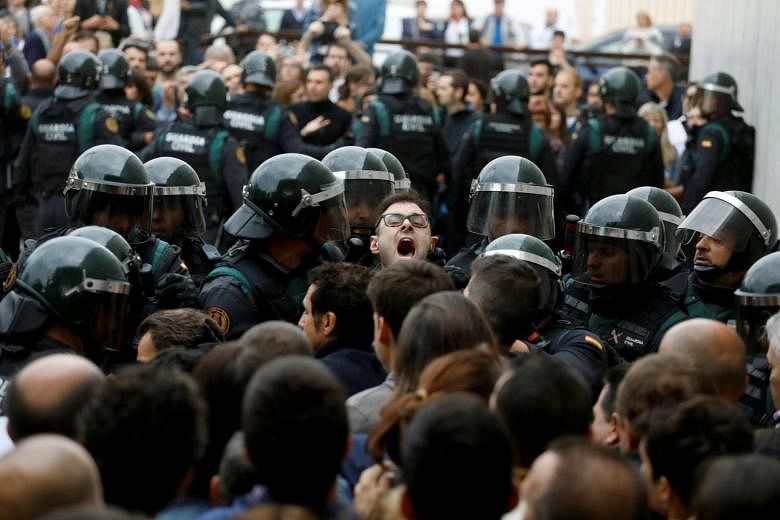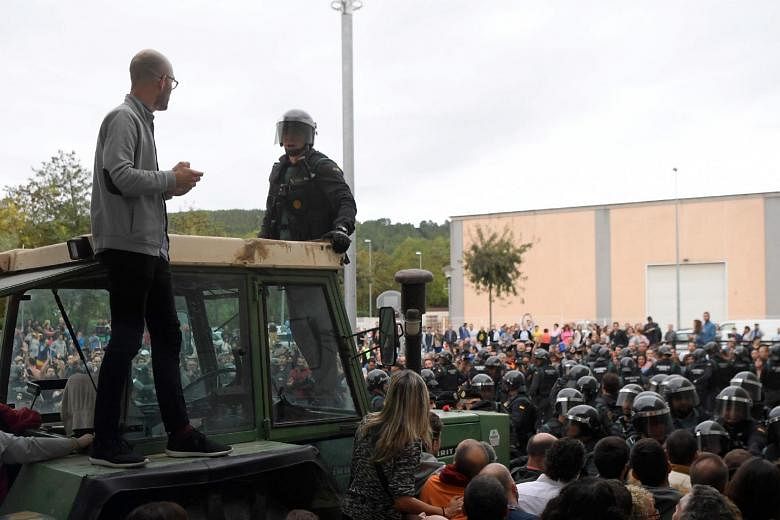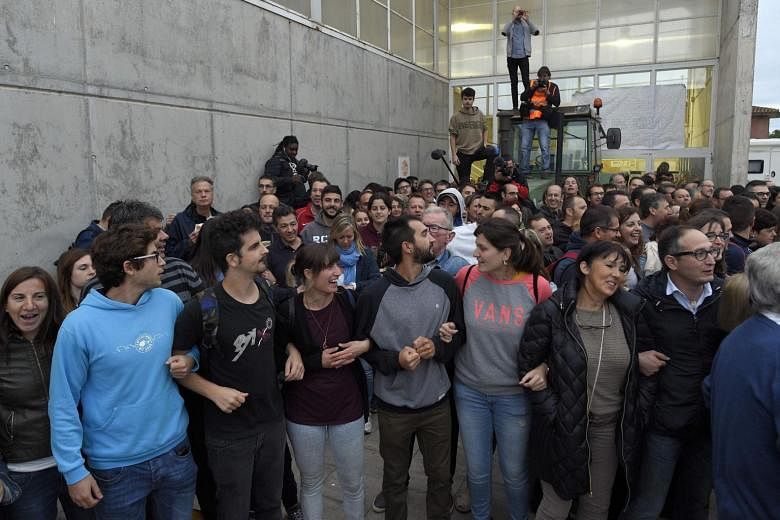MADRID/BARCELONA (AFP, BLOOMBERG) - Spain will do "everything within the law" to prevent Catalonia from declaring independence, Justice Minister Rafael Catala said Monday (Oct 2), a day after Catalonia's regional government declared victory in a banned secession referendum.
"If anyone plans to declare the independence of part of the territory of Spain, as he can't since he does not have the power to do so, we would have to do everything within the law to impede this," he said in an interview with Spanish public television.
Catalan president Carles Puigdemont declared late on Sunday that Catalonia had won the right to break away from Spain after 90 percent of voters taking part in the referendum voted for independence, defying a sometimes violent police crackdown and fierce opposition from Madrid.
He said he would now present the results to the region's parliament, which then had the power to adopt a motion of independence. Pro-separatist lawmakers have a narrow majority of 72 seats in the 135-seat Catalan parliament.
Asked if the central government would use Article 155 of the Spanish constitution, which would allow it to practically suspend the autonomous powers of the northeastern region, Catala said: "That is a tool that is there."
"We have always said that we will use all the force of the law, all the mechanisms that the constitution and the laws grant the government," he added. "We are not here to divide Spaniards, we are here to serve the general interest, therefore if we have to use certain measures that worry us and may hurt, we will do it. It is important to guarantee that Spain has rule of law, that laws are fulfilled," he said.
Two million Catalans backed independence out of 2.3 million votes cast in total, government spokesman Jordi Turull said at a press conference in the early hours of Monday. Just over 5 million people were eligible to vote.
Before the government crackdown began, separatist leaders said they would be comfortable declaring independence with about 1.8 million votes. Puigdemont's time frame could see him announce the formation of a Catalan republic on Oct 6, exactly 83 years since his predecessor as regional president, Lluis Companys, also declared independence. Companys was executed by the dictatorship of Francisco Franco.
"The developments in Catalonia sent the euro lower in early trading, but is unlikely to cause wider negative effects on European asset prices," said Khoon Goh, head of Asia research at Australia & New Zealand Banking Group Ltd. in Singapore. "We could see euro drifting lower especially if the US Federal Reserve acts on their hawkish rhetoric and tax reforms in the US gather momentum."
Prime Minister Mariano Rajoy is wrestling with his country's biggest constitutional crisis since Franco's death in 1975 as Puigdemont looks to harness decades of frustration to force Catalonia out of Spain.
Heading a minority government, Rajoy is fighting to maintain his authority as allies peel off in the national parliament and his officials struggle to enforce the law in the rebel region. While a declaration of independence would have no legal force, and would most likely not be recognised by the international community, it would nevertheless constitute a historic challenge to the authority of the Spanish government and state institutions.
Rajoy has ruled out independence and accused separatists of trying to "blackmail ... the whole nation". He offered all-party talks on the region's future.
The European Commission said on Monday that Sunday's independence referendum in Catalonia was "not legal" but also called on the Spanish government to open dialogue, saying violence could not be an instrument in politics.
"Under the Spanish constitution, yesterday's vote in Catalonia was not legal," the EU executive's chief spokesman Margaritis Schinas told a regular news briefing. "This is an internal matter for Spain that has to be dealt with by the constitutional order in Spain," he said, while adding it was time for unity and dialogue, not violence.
Catalan officials say more than 800 people were injured in clashes with Spanish riot police during the referendum, which has pitched the country into its deepest constitutional crisis in decades and deepened a rift between Madrid and Barcelona.
NEXT STEP?
In another sign that tensions would endure beyond the vote, secessionist groups and trade unions in Catalonia called a general strike for Tuesday, La Vanguardia newspaper said.
"I propose that all political parties with parliamentary representation meet and, together, reflect on the future we all face," Rajoy said in his televised address.
Opinion polls had shown around 40 per cent of the north-eastern region wanted independence from Spain although a majority were in favour of a referendum on the issue.
National police sent in to Catalonia for the referendum swept into polling stations, hitting people with batons, firing rubber bullets into crowds and forcibly removing would-be voters from polling stations, some dragged away by their hair.
"Regardless of views on independence, we should all condemn the scenes being witnessed and call on Spain to change course before someone is seriously hurt," Scotland's pro-independence leader, Nicola Sturgeon, said on Twitter.
Despite the national police action, some polling stations remained open, especially in areas supervised by the Catalan police force which adopted much milder tactics.
"I'm so pleased because despite all the hurdles they've put up, I've managed to vote," said Teresa, a 72-year-old pensioner in Barcelona who had stood in line for six hours to vote.
The ballot will have no legal status as it has been blocked by Spain's Constitutional Court which ruled it at odds with the 1978 constitution that effectively restored democracy in Spain after the dictatorship of General Francisco Franco.







